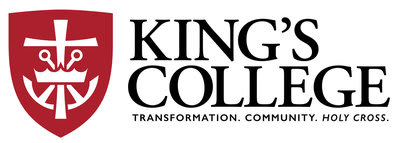
Bachelor of Science in Biology
King's College - Pennsylvania, USA

Key Information
Campus location
Wilkes-Barre, USA
Languages
English
Study format
On-Campus
Duration
4 years
Pace
Full time
Tuition fees
USD 41,600 / per year *
Application deadline
Request info
Earliest start date
Request info
* full time tuition 2022-2023
Scholarships
Explore scholarship opportunities to help fund your studies
Introduction
Biology, the scientific study of life and living organisms, is a very broad field that ranges in scale from molecules to ecosystems. Opportunities available to our graduates are also broad and range from careers in research to medicine to education. Many of our students go on to professions in the health sciences where they apply their understanding of living organisms on a daily basis. Others move on to graduate school or careers in research where they generate new knowledge about living organisms for the scientific community.
Admissions
Curriculum
To prepare students for the diversity of professional and academic opportunities, the Biology curriculum uses a series of introductory courses to establish a broad foundation. Many students continue to choose courses from a diverse range of topics during their 3rd and 4th years, though our curriculum also allows students to specialize in particular areas of study or emphases. The Biology curriculum is rigorous, but it allows students the opportunity to earn minor or complete significant coursework in other fields in science and math as well as education, social sciences, and the humanities.
In addition to learning the major concepts and tenets of biology, students regularly apply the scientific method paradigm in introductory and advanced courses. All students will actively participate in the scientific processes by searching the scientific literature, designing and conducting experiments, and presenting their results in written and oral forms. Many students will conduct independent research projects and present their results at regional or national conferences.
Biology majors wishing to complete major sequence requirements at other institutions must complete these requirements at a four-year institution and have the prior approval of the Biology Department.
Compatible Minors:
- Chemistry
- Neuroscience
- Education
- Psychology
- Environmental studies
- Business
- Marketing
- Communications
- Political Science
- Forensic Studies
Special Features:
- Off-campus internships
- Parente Life Science Center with state-of-the-art teaching and research laboratories and equipment
- Undergraduate research
- Academic and career advisement programs
- Peer tutoring programs
- Work-study opportunities
- Guest speaker programs
It is the aim of the department of biology: (1) to give the student a knowledge of organisms and the biosphere; (2) to prepare the student for advanced studies in the biological sciences, the medical, dental, paramedical, allied health, and other professional fields; (3) to prepare the student to teach the natural sciences on the secondary level. Career paths include:
- Health and allied health professions
- Biotechnology
- Pharmaceuticals
- Research and development
- Teaching
- Environmental research and applications
- Agricultural sciences and agribusiness
- Law
- Business
- Forensic sciences
- Scientific equipment and supplies
- Manufacturing and sales
- Biological research
- Neuroscience
- Clinical laboratory science
- Respiratory, physical, and occupational therapy
- State and federal governmental science agencies
Biology Major Sequence Requirements
(19 courses — 66 credits)
- BIOL 113 Evolution and Diversity with Lab (4)
- BIOL 210 Organisms and Their Ecosystems with Lab (4)
- BIOL 213 Cell and Molecular Biology with Lab (4)
- BIOL 270 Sophomore Seminar (1)
- BIOL 370 Junior Seminar (2)
- BIOL 470 Senior Seminar (1)
- CHEM 113 General Chemistry I with Lab (4)
- CHEM 114 General Chemistry II with Lab (4)
- CHEM 241 Organic Chemistry I with Lab (4)
- CHEM 242 Organic Chemistry II with Lab (4)
- MATH 125 Calculus (4)
- MATH 128 Introduction to Statistics and Data Analysis (4)
- PHYS 111 General Physics I with Lab (4)
- PHYS 112 General Physics II with Lab (4)
In addition, students must complete 5 upper-level electives (300 and 400 level except BIOL 370, 490, 491, and 499). Three of the electives must include a laboratory section, and at least one of the laboratory courses must be chosen from a list of Research-Intensive Courses.
Biology majors have the option to choose one of the following emphases. A student who selects an emphasis must complete five courses (minimum of three with a lab) from within one of the following lists, including the required courses (*) for the emphasis.
Pre-Health Emphasis
- *BIOL 355 Comparative Anatomy
- *BIOL 447 Physiology
- BIOL 314 Microbiology
- BIOL 323 Genetics
- BIOL 324 Biochemistry
- BIOL 326 Immunology
- BIOL 336 Cell Biology
- BIOL 350 Embryology
- BIOL 380 Neuroendocrinology
- BIOL 416 Parasitology
- BIOL 456 Molecular Neurobiology
- BIOL 490 Biological Research
Molecular Biology Emphasis
- *BIOL 323 Genetics
- *BIOL 450 DNA Science
- BIOL 314 Microbiology
- BIOL 324 Biochemistry
- BIOL 326 Immunology
- BIOL 330 Introduction to Bioinformatics
- BIOL 336 Cell Biology
- BIOL 453 Systems Biology
- BIOL 456 Molecular Neurobiology
- BIOL 490 Biological Research
Ecology Emphasis
- *BIOL 430 Ecology
- BIOL 310 Computer Modeling
- BIOL 314 Microbiology
- BIOL 349 Animal Behavior
- BIOL 416 Parasitology
- BIOL 420 Botany
- BIOL 401 Variable Topics in Environmental Science
- ENST 410 Ecological and Environmental Sampling and Analysis
- BIOL 490 Biological Research